The Medical System Is Ableist
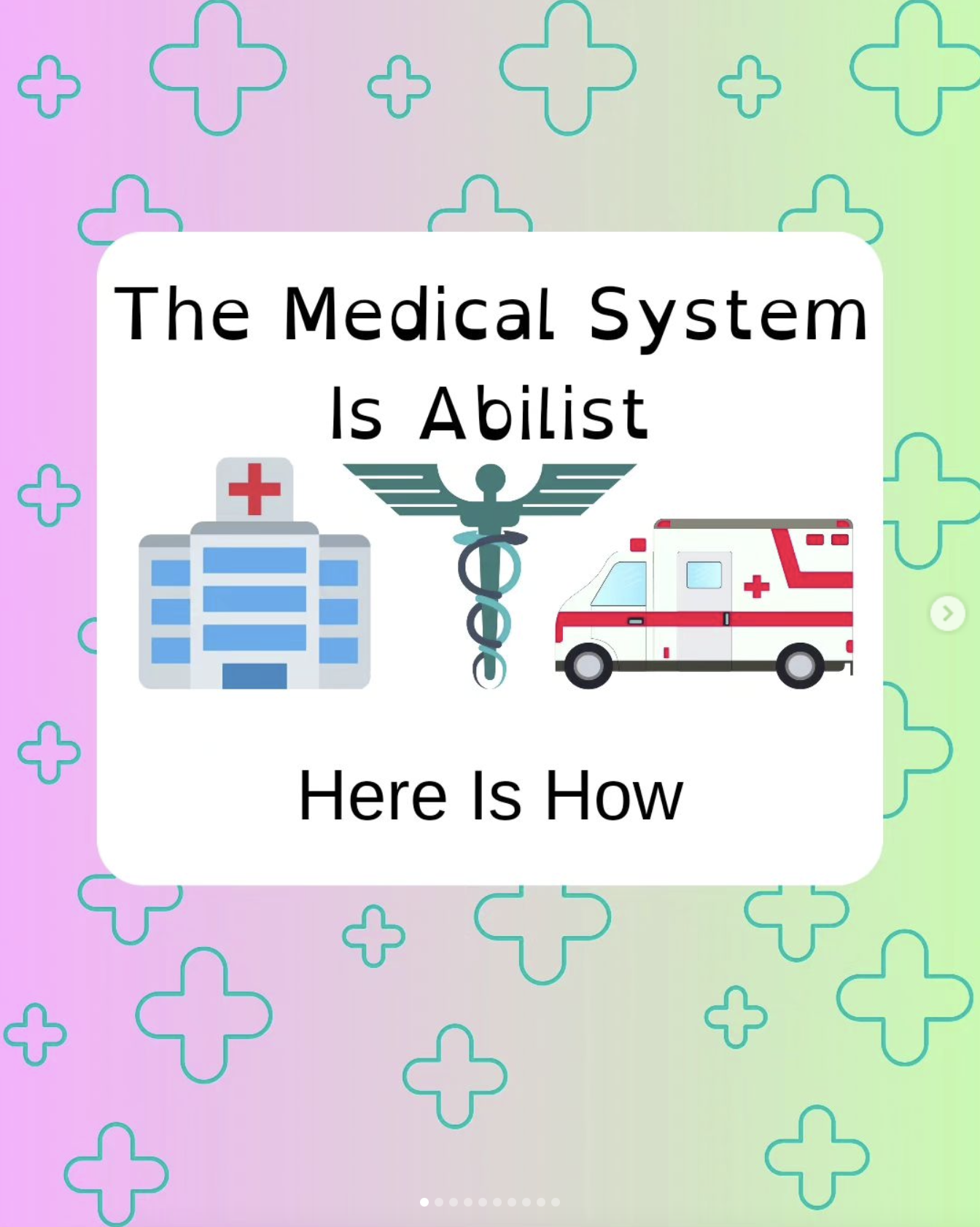
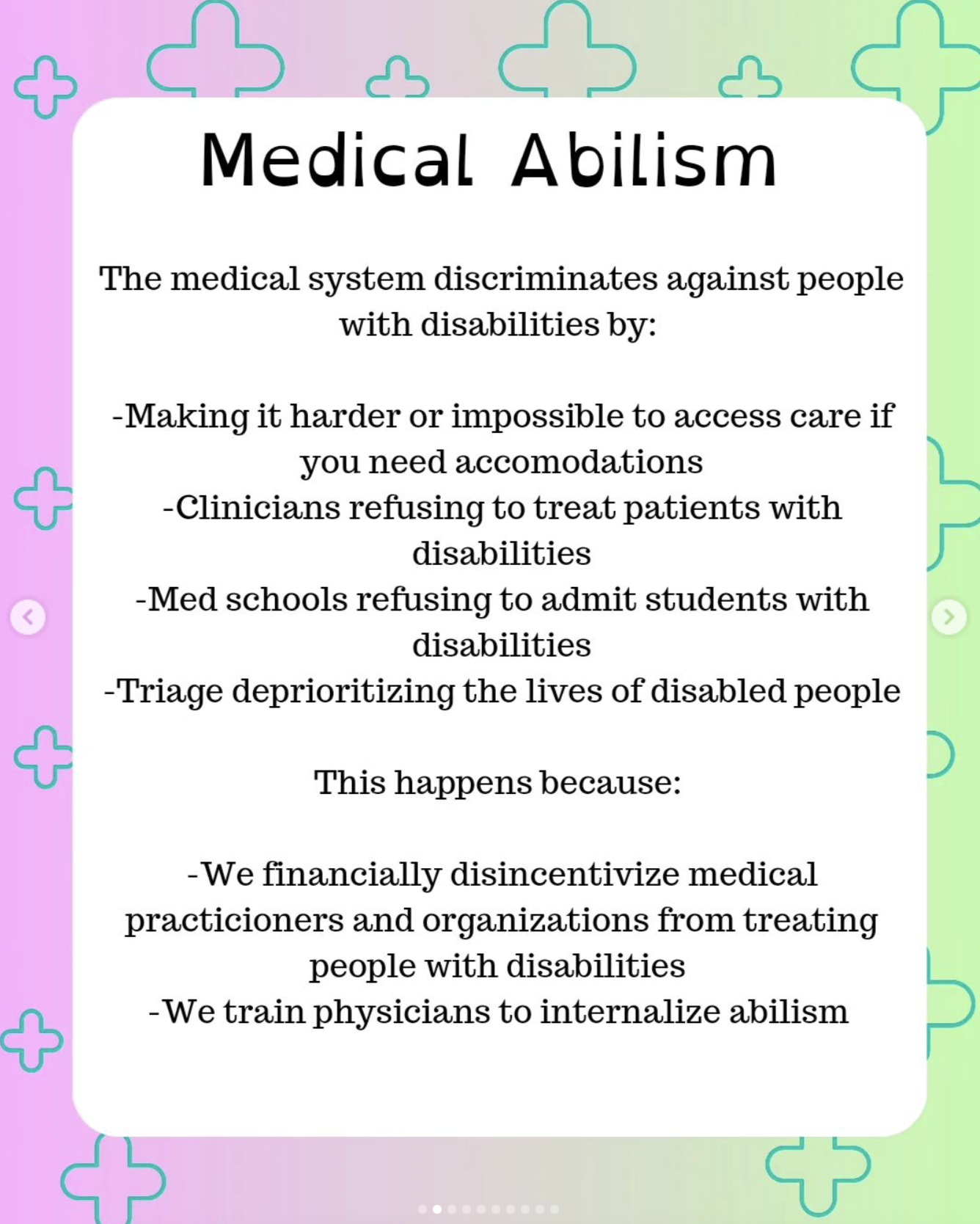
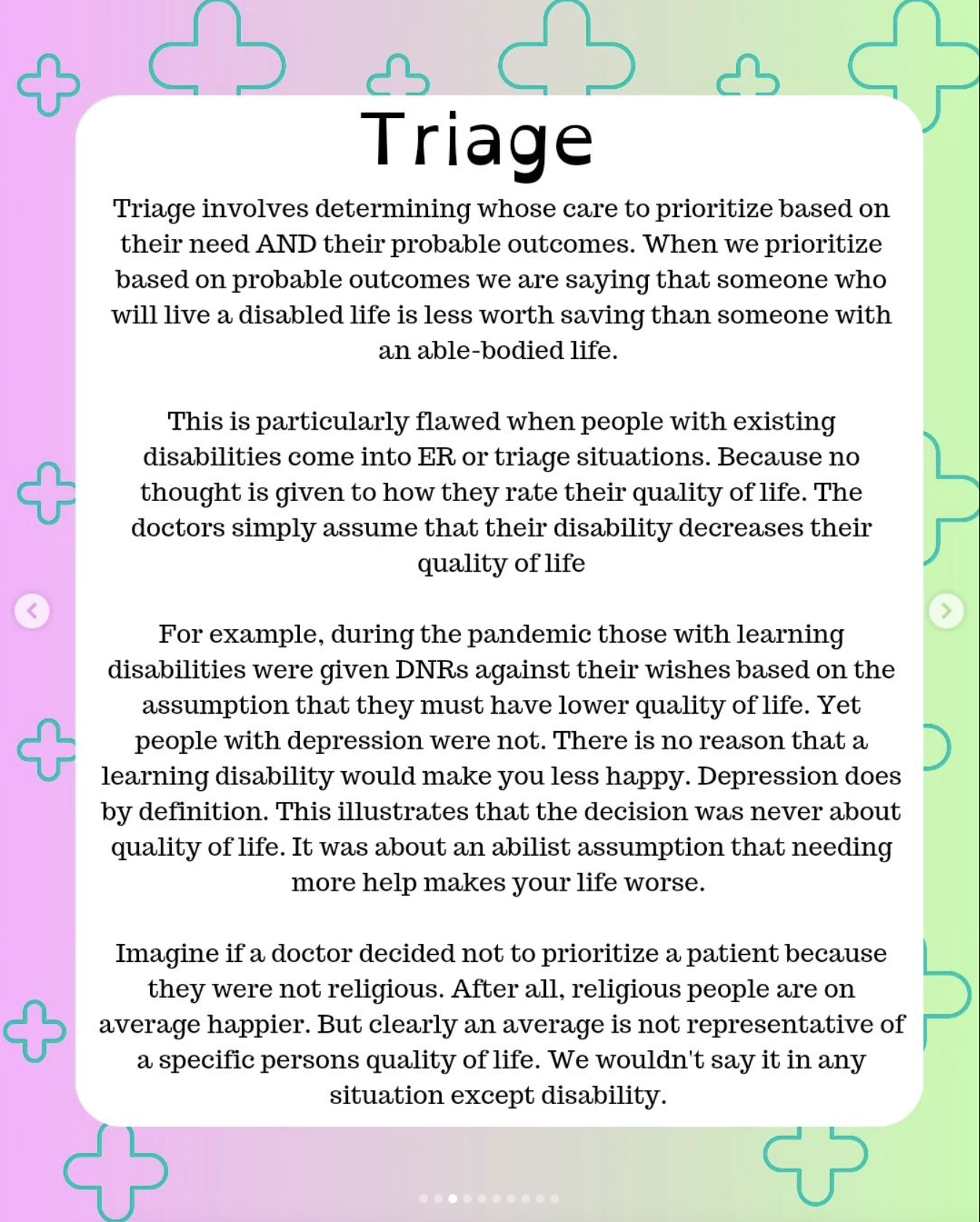
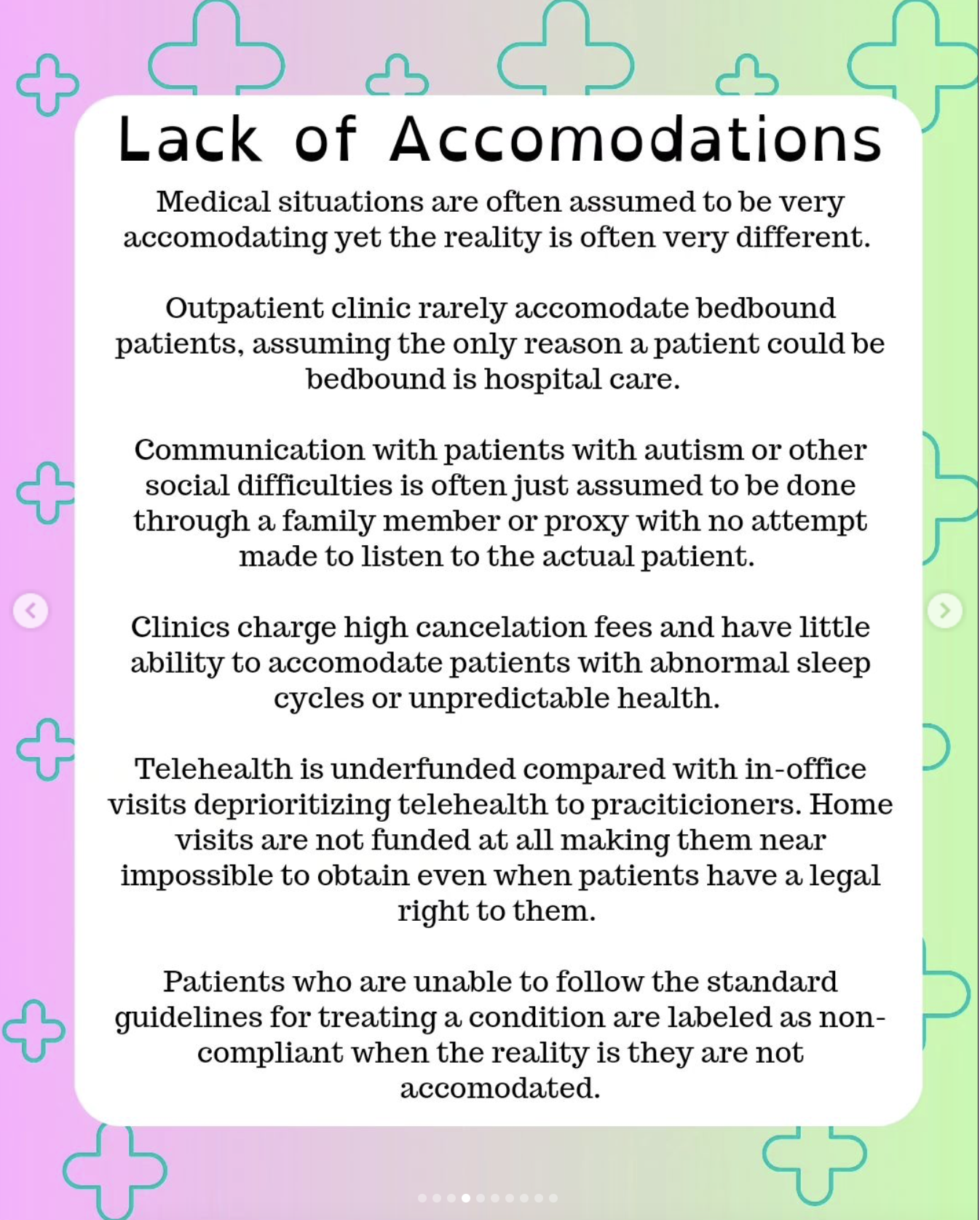
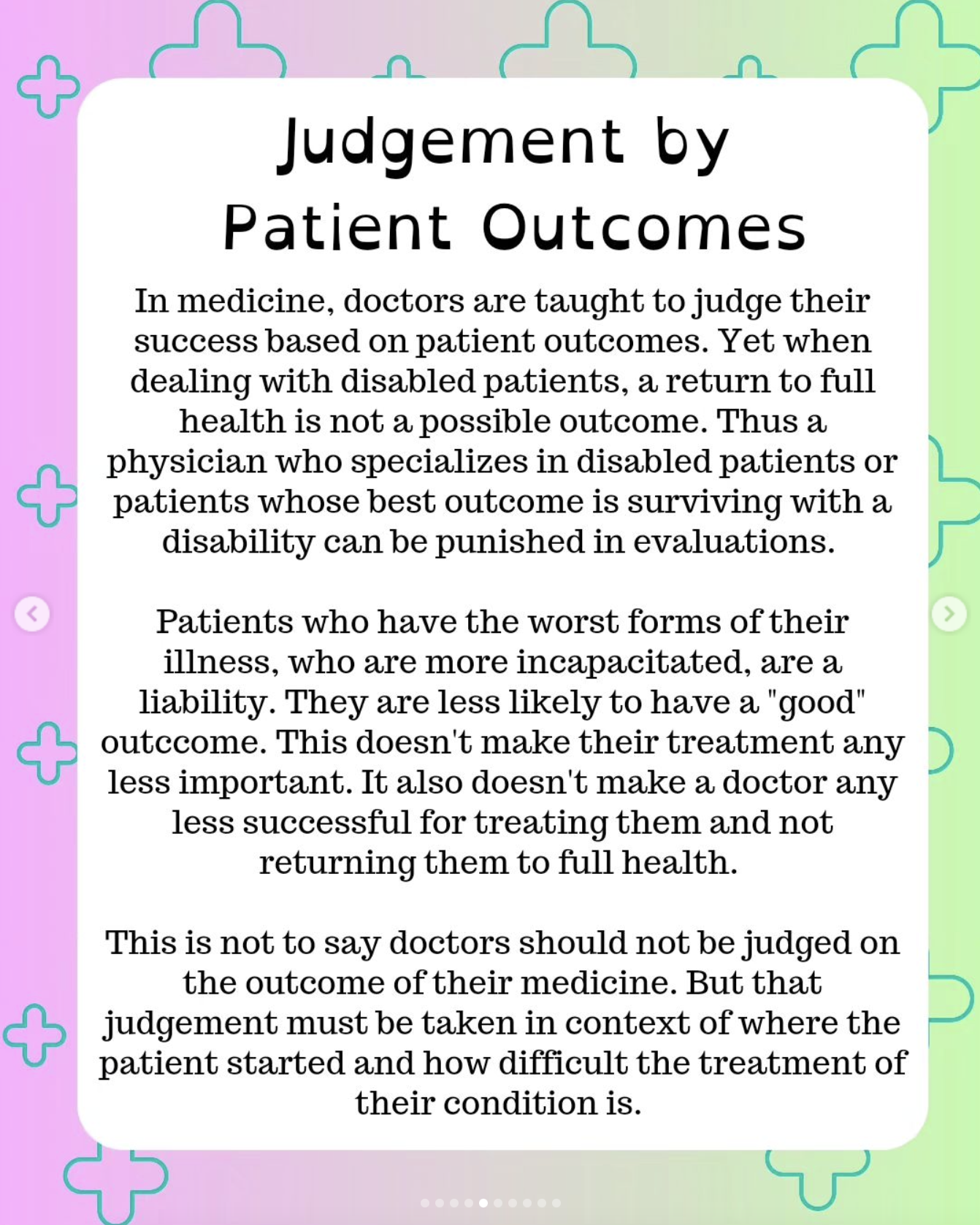
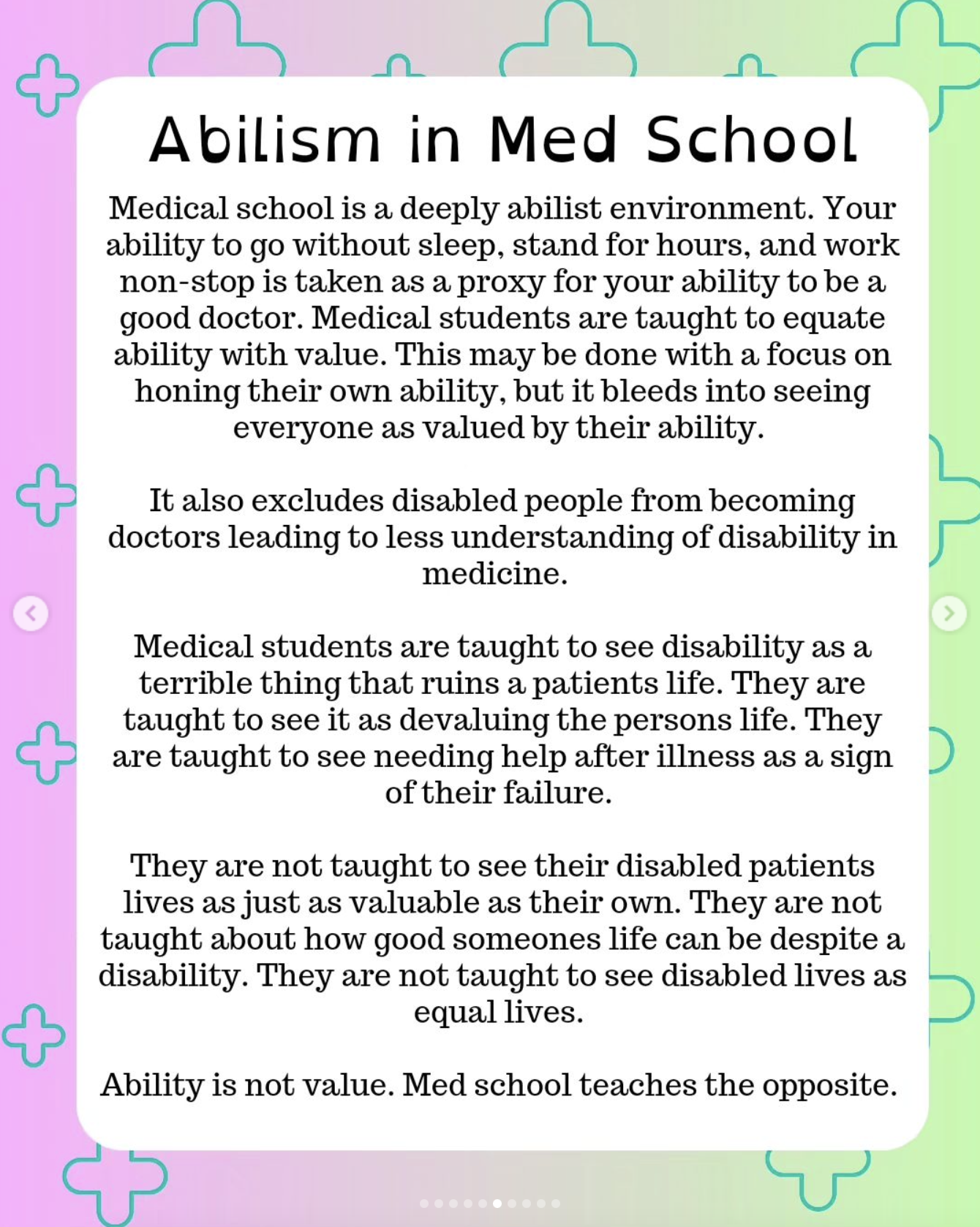
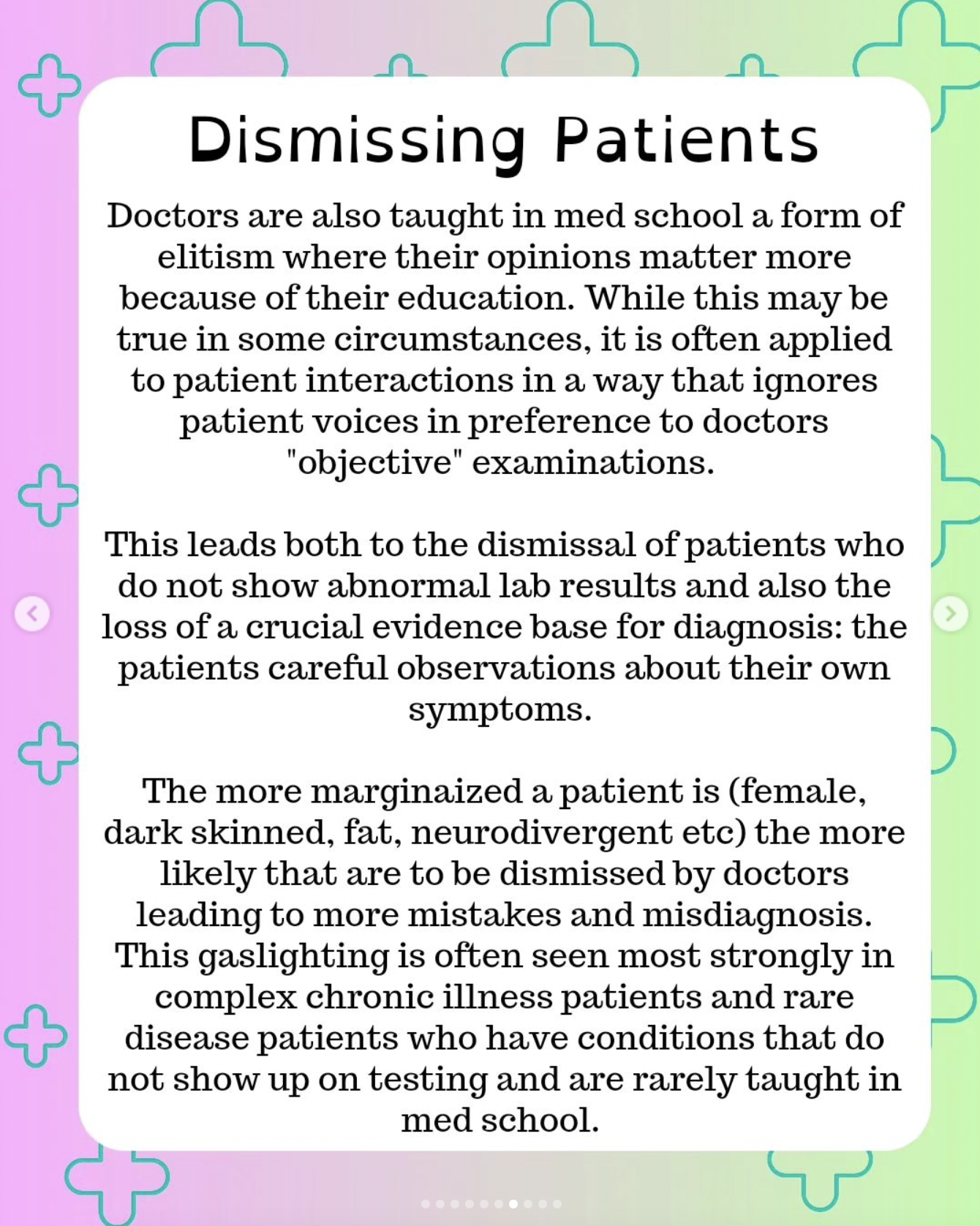
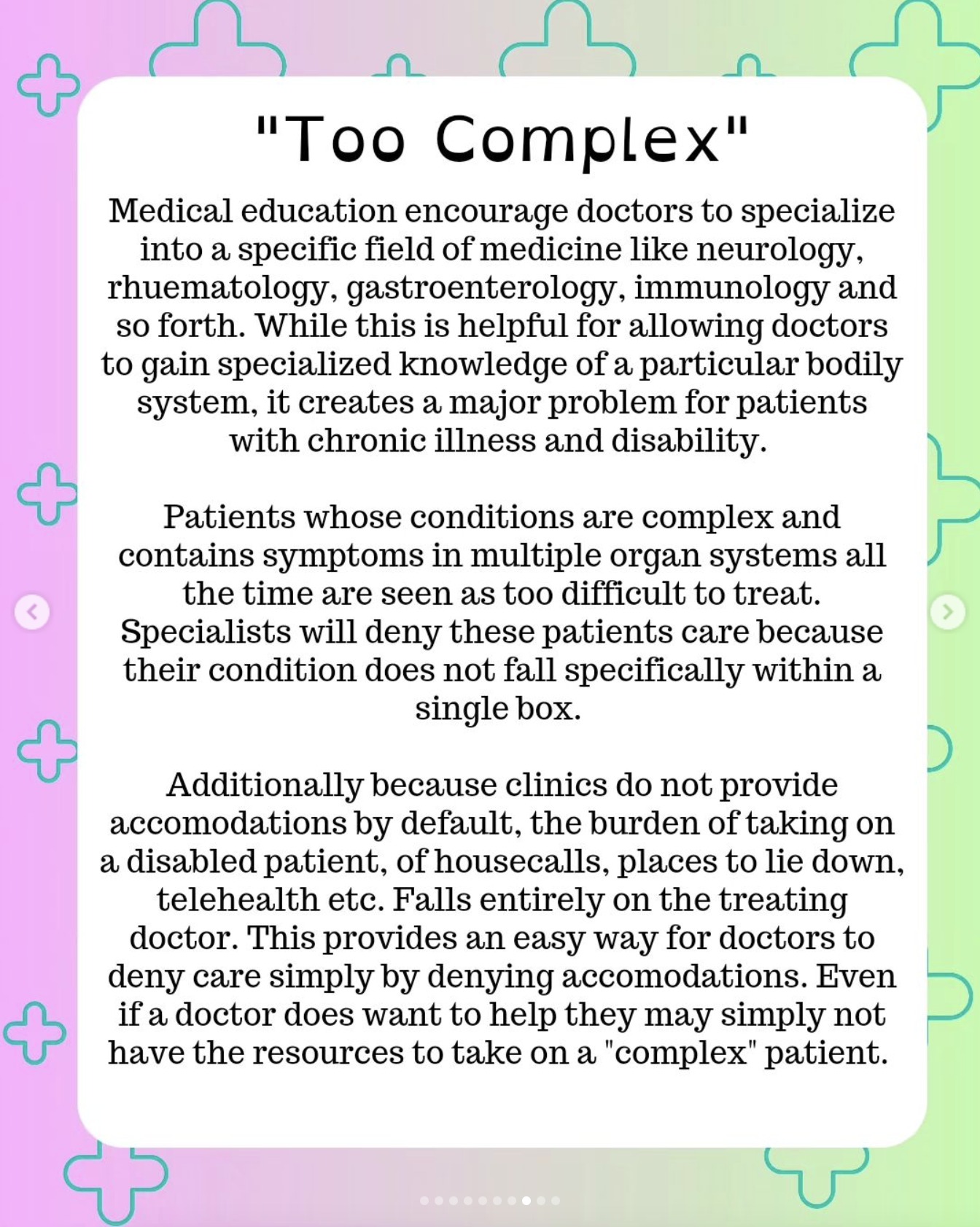
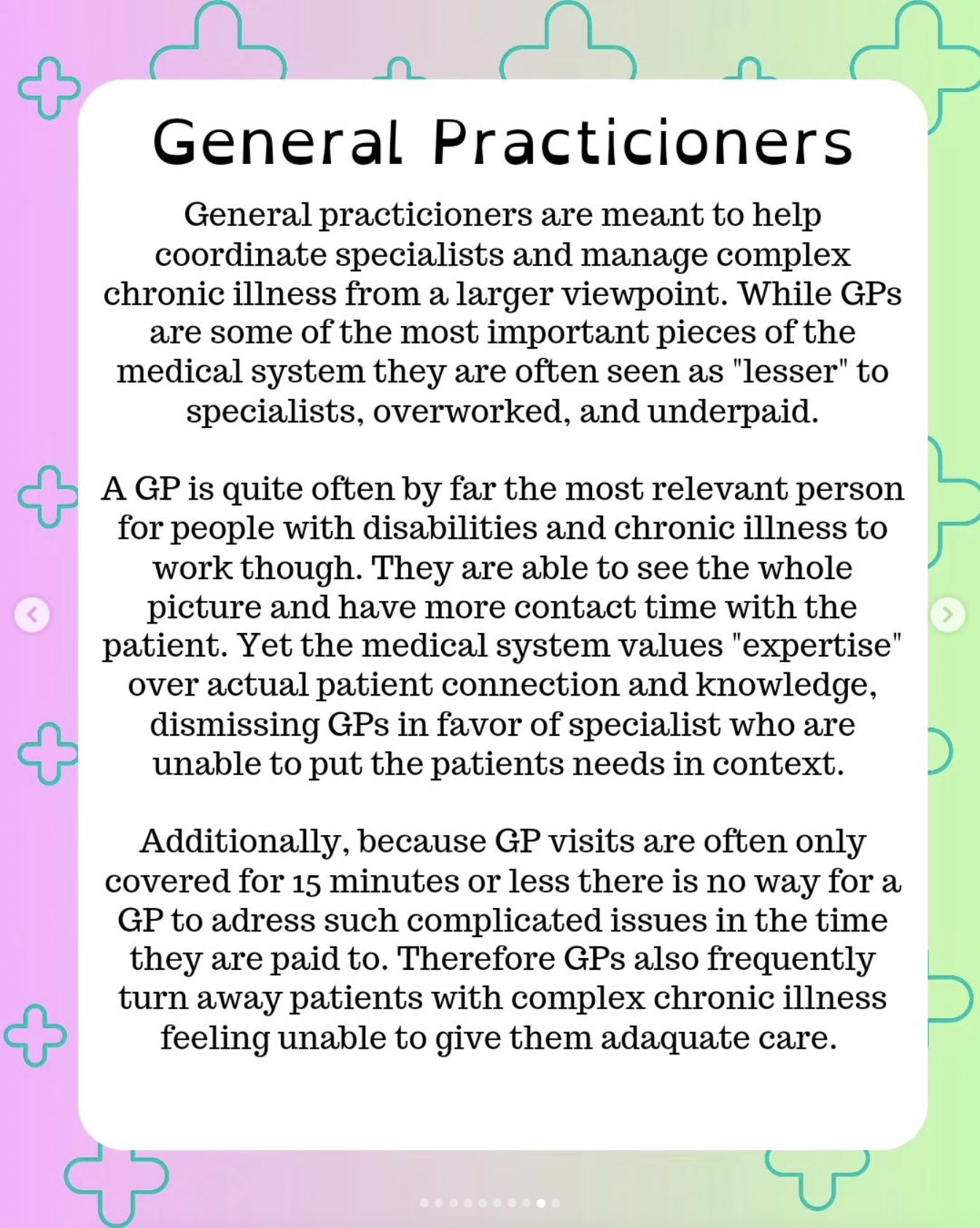
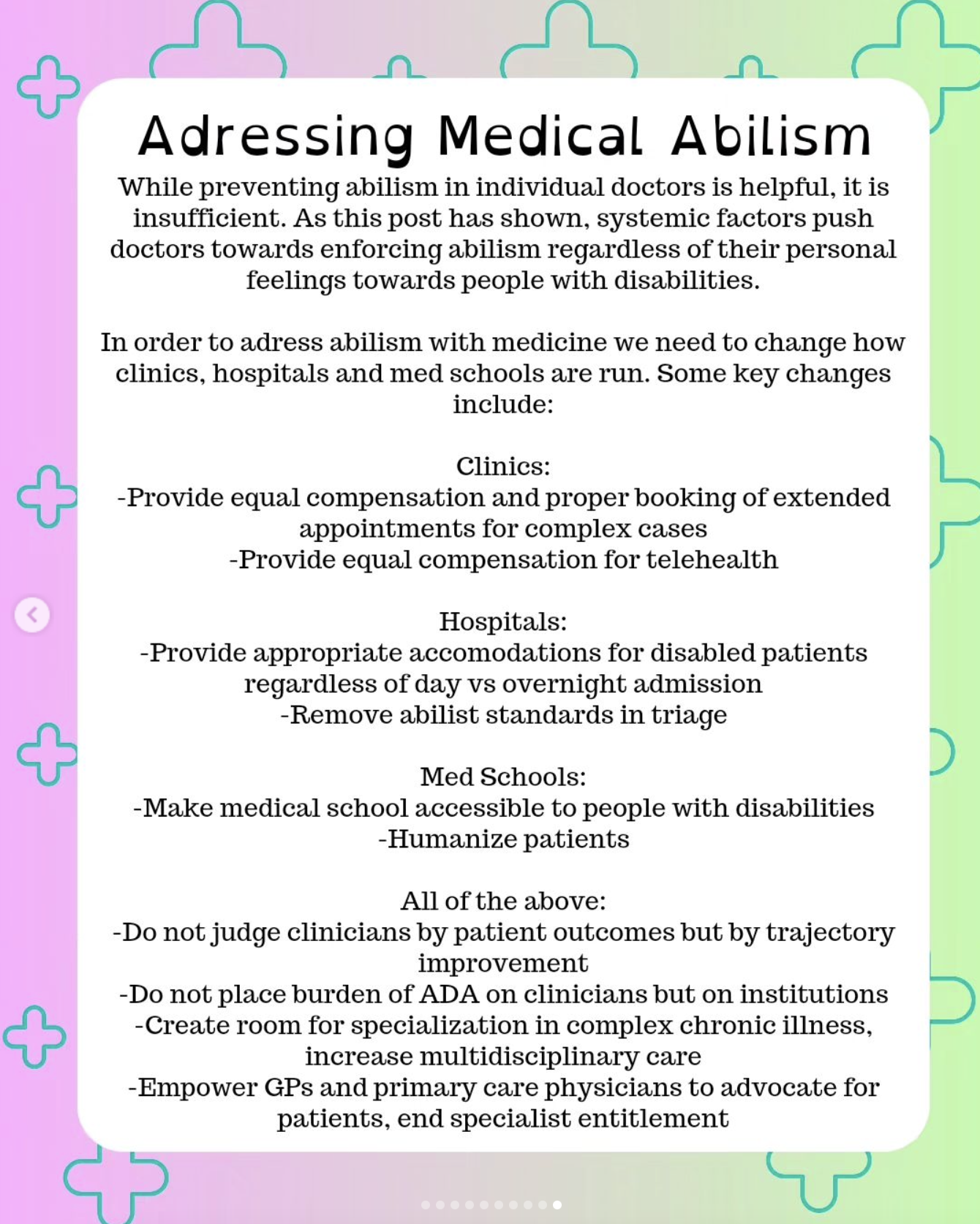
Here is how
—-
Medical Abilism
The medical system discriminates against people with disabilities by:
-Making it harder or impossible to access care if you need accommodations
-Clinicians refusing to treat patients with disabilities
-Med schools refusing to admit students with disabilities
-Triage deprioritizing the lives of disabled people
This happens because:
-We financially disincentivize medical practitioners and organizations from treating people with disabilities
-We train physicians to internalize ableism
—-
Triage
Triage involves determining whose care to prioritize based on their need AND their probable outcomes. When we prioritize based on probable outcomes we are saying that someone who will live a disabled life is less worth saving than someone with an able-bodied life.
This is particularly flawed when people with existing disabilities come into ER or triage situations. Because no thought is given to how they rate their quality of life. The doctors simply assume that their disability decreases their quality of life
For example, during the pandemic those with learning disabilities were given DNRs against their wishes based on the assumption that they must have lower quality of life. Yet people with depression were not. There is no reason that a learning disability would make you less happy. Depression does by definition. This illustrates that the decision was never about quality of life. It was about an ableist assumption that needing
more help makes your life worse.
Imagine if a doctor decided not to prioritize a patient because they were not religious. After all, religious people are on average happier. But clearly, an average is not representative of a specific person’s quality of life. We wouldn't say it in any situation except disability.
—-
Lack of Accommodations
Medical situations are often assumed to be very accommodating yet the reality is often very different.
Outpatient clinics rarely accommodate bedbound patients, assuming the only reason a patient could be bedbound is hospital care.
Communication with patients with autism or other social difficulties is often just assumed to be done through a family member or proxy with no attempt made to listen to the actual patient.
Clinics charge high cancelation fees and have little ability to accommodate patients with abnormal sleep cycles or unpredictable health.
Telehealth is underfunded compared with in-office visits deprioritizing telehealth to practitioners. Home visits are not funded at all making them near impossible to obtain even when patients have a legal right to them.
Patients who are unable to follow the standard guidelines for treating a condition are labeled as non-compliant when the reality is they are not accommodated.
—-
Judgment by Patient Outcomes
In medicine, doctors are taught to judge their success based on patient outcomes. Yet when dealing with disabled patients, a return to full health is not a possible outcome. Thus a physician who specializes in disabled patients or patients whose best outcome is surviving with a disability can be punished in evaluations.
Patients who have the worst forms of their illness, who are more incapacitated, are a liability. They are less likely to have a "good" outcome. This doesn't make their treatment any less important. It also doesn't make a doctor any less successful for treating them and not returning them to full health.
This is not to say doctors should not be judged on the outcome of their medicine. But that
judgement must be taken in context of where the patient started and how difficult the treatment of
their condition is.
—-
Abilism in Med School
Medical school is a deeply abilist environment. Your ability to go without sleep, stand for hours, and work non-stop is taken as a proxy for your ability to be a good doctor. Medical students are taught to equate ability with value. This may be done with a focus on honing their own ability, but it bleeds into seeing everyone as valued by their ability.
It also excludes disabled people from becoming doctors leading to less understanding of disability in
medicine.
Medical students are taught to see disability as a terrible thing that ruins a patients life. They are taught to see it as devaluing the person’s life. They are taught to see needing help after illness as a sign of their failure.
They are not taught to see their disabled patients’ lives as just as valuable as their own. They are not taught about how good someone’s life can be despite a disability. They are not taught to see disabled lives as equal lives.
Ability is not value. Med school teaches the opposite.
—-
Dismissing Patients
Doctors are also taught in med school a form of elitism where their opinions matter more because of their education. While this may be true in some circumstances, it is often applied to patient interactions in a way that ignores patient voices in preference to doctors’ "objective" examinations.
This leads both to the dismissal of patients who do not show abnormal lab results and also the loss of a crucial evidence base for diagnosis: the patient’s careful observations about their own symptoms.
The more marginalized a patient is (female, dark-skinned, fat, neurodivergent etc) the more likely they are to be dismissed by doctors leading to more mistakes and misdiagnosis. This gaslighting is often seen most strongly in complex chronic illness patients and rare disease patients who have conditions that do not show up on testing and are rarely taught in med school.
—-
"Too Complex"
Medical education encourages doctors to specialize into a specific field of medicine like neurology, rheumatology, gastroenterology, immunology and so forth. While this is helpful for allowing doctors to gain specialized knowledge of a particular bodily system, it creates a major problem for patients with chronic illness and disability.
Patients whose conditions are complex and contain symptoms in multiple organ systems all the time are seen as too difficult to treat. Specialists will deny these patients care because their condition does not fall specifically within a single box.
Additionally, because clinics do not provide accommodations by default, the burden of taking on a disabled patient, of house calls, places to lie down, telehealth etc. Falls entirely on the treating doctor. This provides an easy way for doctors to deny care simply by denying accommodations. Even if a doctor does want to help they may simply not have the resources to take on a "complex" patient.
—-
General Practicioners
General practitioners are meant to help coordinate specialists and manage complex chronic illnesses from a larger viewpoint. While GPs are some of the most important pieces of the medical system they are often seen as "lesser" to specialists, overworked, and underpaid.
A GP is quite often by far the most relevant person for people with disabilities and chronic illnesses to work though. They are able to see the whole picture and have more contact time with the patient. Yet the medical system values "expertise" over actual patient connection and knowledge, dismissing GPs in favor of specialists who are unable to put the patient’s needs in context.
Additionally, because GP visits are often only covered for 15 minutes or less there is no way for a GP to adress such complicated issues in the time they are paid to. Therefore GPs also frequently turn away patients with complex chronic illnesses feeling unable to give them adequate care.
—-
Medical Ableism is commonplace and dangerous.
⠀
The Medical Model of disability presents disabilities as illnesses in need of curing. While this can be a useful framing, especially in the case of chronic illness and rare diseases it makes a number of incorrect assumptions that go on to lead to ableism in med school and doctors.
⠀
Quality of life is not solely based on level of health. It is certainly not based on the amount of assistance one needs (although does depend heavily on the amount of assistance one needs and does not recieve)
⠀
Disabled lives are not lesser to able bodied lives. The amount of meaning and purpose someone has in life is not dependent only on their productivity.
⠀
Productivity and length of life is not the only way to measure medical success. Reductions in pain and symptoms and improvements in quality of life are just as important.
⠀
Being chronically ill and having diseases of unknown origin such as Myalgic Encephalomyelitis or MECFS, Long Covid and Fibromyalgia is not a personal failing.
⠀
Even when doctors do not hold all of these ableist assumptions, the medical system is designed to work against doctors accomodating and treating disabled patients with respect and dignity. From the way medical schools dismiss the potential of anyone who cannot work 80 hour weeks on minimal sleep, abilism is the first lesson taught to prospective doctors.
⠀
The constant deference to specialists who do not see a patients whole medical picture, the discounting of patient testimony in favor of "objective" medical tests (even when no such tests exist for a condition), the rushed appointments and lack of protection for immunosurpressed and immunocompromised individuals all leads to disabled patients lacking quality healthcare.
⠀
For housebound and bedbound patients the lack of telehealth and home healthcare can exclude patients from care altogether.
⠀
Disabled people have higher healthcare needs on average. We deserve to have them met. Healthcare should be a place supportive of disabilities, not terrified of them.